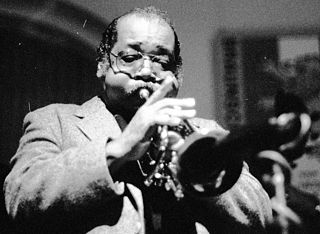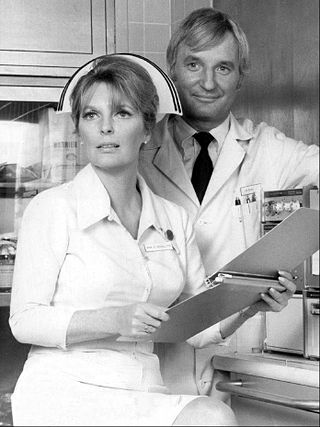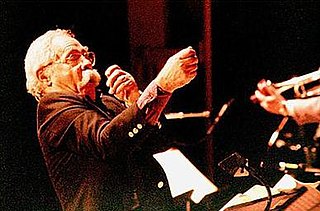Related Research Articles

Julian Edwin "Cannonball" Adderley was an American jazz alto saxophonist of the hard bop era of the 1950s and 1960s.

"In the Mood" is a popular big band-era jazz standard recorded by American bandleader Glenn Miller. "In the Mood" is based on the composition "Tar Paper Stomp" by Wingy Manone. The first recording under the name "In the Mood" was released by Edgar Hayes & His Orchestra in 1938.
Nathan Irving Hentoff was an American historian, novelist, jazz and country music critic, and syndicated columnist for United Media. Hentoff was a columnist for The Village Voice from 1958 to 2009. Following his departure from The Village Voice, Hentoff became a senior fellow at the Cato Institute and continued writing his music column for The Wall Street Journal, which published his works until his death. He often wrote on First Amendment issues, vigorously defending the freedom of the press.

Gunther Alexander Schuller was an American composer, conductor, horn player, author, historian, educator, publisher, and jazz musician.

Charles Ellsworth "Pee Wee" Russell, was an American jazz musician. Early in his career he played clarinet and saxophones, but he eventually focused solely on clarinet.
Gerome Ragni was an American actor, singer, and songwriter, best known as one of the stars and co-writers of the 1967 musical Hair: The American Tribal Love-Rock Musical. On June 18, 2009, he was inducted into the Songwriters Hall of Fame.

Nathaniel Carlyle Adderley was an American jazz trumpeter. He was the younger brother of saxophonist Julian "Cannonball" Adderley, whom he supported and played with for many years.
Arthur Terence Galt MacDermot was a Canadian-American composer, pianist and writer of musical theater. He won a Grammy Award for the song "African Waltz" in 1960. His most-successful musicals were Hair and Two Gentlemen of Verona (1971). MacDermot also composed music for film soundtracks, jazz and funk albums, and classical music, and his music has been sampled in hit hip-hop songs and albums. He is best known for his work on Hair, which produced three number-one singles in 1969: "Aquarius/Let the Sunshine In", "Good Morning Starshine", and the title song "Hair".

Robert William Troup Jr. was an American actor, jazz pianist, singer, and songwriter. He wrote the song "Route 66" and acted in the role of Dr. Joe Early with his wife Julie London in the television program Emergency! in the 1970s.

Attilio Joseph "Teo" Macero was an American jazz saxophonist, composer, and record producer. He was a producer at Columbia Records for twenty years. Macero produced Miles Davis' Bitches Brew, and Dave Brubeck's Time Out, two of the best-selling and most influential jazz albums of all time. Although the extent of his role has been disputed, he also has been associated with the production of Davis' 1959 album Kind of Blue, jazz's best-selling record. Macero was known for his innovative use of editing and tape manipulation unprecedented in jazz and proving influential on subsequent fusion, experimental rock, electronica, post-punk, no wave, and acid jazz.
Shapiro, and its variations such as Shapira, Schapiro, Schapira, Sapir, Sapira, Spira, Sapiro, Spiro (name)/Spyro, Szapiro/Szpiro and Chapiro, is a Jewish Ashkenazi surname.
"Sunshine of Your Love" is a 1967 song by the British rock band Cream. With elements of hard rock, psychedelia, and pop, it is one of Cream's best known and most popular songs. Cream bassist and vocalist Jack Bruce based it on a distinctive bass riff he developed after attending a Jimi Hendrix concert. Guitarist Eric Clapton and lyricist Pete Brown later contributed to the song and drummer Ginger Baker plays a distinctive tom-tom drum rhythm.
Frederick Emil Ahlert was an American composer and songwriter.

Orrin Keepnews was an American jazz writer and record producer known for founding Riverside Records and Milestone Records, for freelance work, and for his work at other labels.

Manny Albam was an American jazz saxophonist, composer, arranger, record producer, and educator.
The Naked Brothers Band is an American musical comedy television series created by Polly Draper, which aired on Nickelodeon from February 3, 2007, to June 13, 2009. It depicts the daily lives of Draper's sons, who lead a faux world-renowned children's rock band in New York City. As a mockumentary, the storyline is an embellished satire of their real lives, and the fictional presence of a camera is often acknowledged. The show stars Nat Wolff and Alex Wolff, the lead singer-songwriter and drummer, respectively. Nat's fictional female interest and real-life friends Thomas Batuello, David Levi, and Cooper Pillot, as well as Qaasim Middleton—who has no prior acquaintance with the family—are featured as the other band members, with Draper's jazz musician husband Michael Wolff as his sons' widowed accordion-playing dad and her niece Jesse Draper portraying the group's babysitter.
"Don't Blame Me" is a popular song with music by Jimmy McHugh and lyrics by Dorothy Fields. The song was part of the 1932 show Clowns in Clover and was published in 1933. Popular versions that year were recorded by: Ethel Waters, Guy Lombardo, and Charles Agnew.
Albert J. McCarthy was an English jazz and blues discographer, critic, historian, and editor.

Bill Simon was an American songwriter, musician and music critic. He was a contributor to the music business in the mid-20th century, notably as a jazz commentator for Billboard Magazine and other publications.
Nat is a given name, nickname and surname.